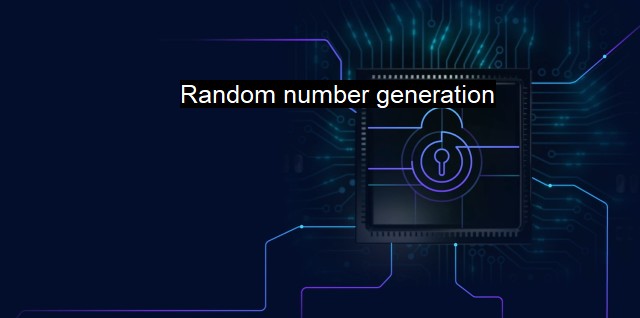What is Random number generation?
The Critical Role of Random Number Generation (RNG) in Cybersecurity: Exploring its Importance, Limitations and Notorious Threats
Random number generation, in the context of cybersecurity and antivirus applications, is a process or algorithm that generates a sequence of numbers that cannot be reasonably or easily predicted more accurately than by random chance. Many critical security processes, ranging from encryption and authentication mechanisms to antivirus operations, rely on the creation of unpredictable, non-repeating numbers, commonly termed random numbers.The term "random" may insinuate absolute randomness, although in the realm of computers, outright randomness is virtually impossible to obtain. This is because computers operate based on defined instructions, and thus numbers generated by computers are better termed as pseudorandom. for standard security practices, pseudorandom numbers sufficiently satisfy the randomness requirements.
Random number generation is an essential apparatus of cryptography, lying at its heart. Cryptographic systems protect vital information as it travels over untrustworthy channels like the internet, ensuring that unauthorized parties cannot access or comprehend it. Strong random number generation is paramount, as the security of many cryptographic processes hinges on generated keys' unpredictability and unguessability.
For instance, encryption algorithms depend on random numbers to generate unique keys for each encryption session. These keys ensure that even if an unauthorized entity gains access to a past encryption key, they cannot decrypt future or past transmissions as every session uses a randomly different key.
Let's delve into one of the traditional cryptographic methods—the symmetric-key cryptography—to underline the gravity of random number generation. In this technique, both parties (sender and receiver) share a commonly known key, used to decipher and encrypt the message. If the key is not random and intelligible, an attacker might guess it, leading to successful eavesdropping.
Speaking of antivirus mechanisms, random number generation has a significant role too. confirmation codes that antivirus software uses in confirming user identity during password recovery are impossible to guess or predict due to randomness. the software often deploys random timers to periodically scan your system for malware, making it arduous for malicious software to second guess when the next scan will occur.
Contrary to the predicament computers face in generating truly random numbers, it would be useless for humans. People tend to spot patterns where they don’t exist or favor certain numbers. Therefore, the use of automatic pseudorandom number generators is key to ensuring fair and secure operations in cyberspace.
Achieving strong pseudorandomness isn’t a cakewalk. One must intricately address potential systematic irregularities and correlations between the numbers, which could compromise the system's security. All told, random number generation techniques for cybersecurity are intensely researched and continuously developed to deliver highly secure and robust encryption and authentication mechanisms in ever-evolving digital terrain.
To distill in a sentence, random number generation is thus crucial to cybersecurity and antivirus operations. Without properly random numbers, encryption keys become predictable, and consequently, banking transactions, private conversations, and other confidential information standards are left vulnerable to interception or attacks. We might even venture to say that random number generation stands as an unassuming but sturdy barricade in our fight against cyber threats, making it a less lauded yet vital pillar of cybersecurity.

Random number generation FAQs
What is random number generation?
Random number generation refers to the process of generating a sequence of numbers that appear to be random. These numbers are not predictable and cannot be reproduced. In cybersecurity and antivirus, random number generation is used to create unique keys, passwords, and other security-related parameters.Why is random number generation important for cybersecurity and antivirus?
Random number generation is important for cybersecurity and antivirus because it helps to create unique and unpredictable keys, passwords, and other security-related parameters. This makes it more difficult for attackers to guess or brute-force their way into systems or networks.What are some methods of random number generation?
Some common methods of random number generation include simple random sampling, computer algorithms, and hardware-based approaches such as using radioactive decay or thermal noise.What are the best practices for random number generation in cybersecurity and antivirus?
Some best practices for random number generation in cybersecurity and antivirus include using a strong random number generator that is regularly updated, using a sufficient number of random bits to ensure unpredictability, and using separate keys for different applications or systems. Additionally, it's important to minimize exposure of random numbers or keys to potential attackers, such as through encryption and secure storage.| | A | | | B | | | C | | | D | | | E | | | F | | | G | | | H | | | I | | | J | | | K | | | L | | | M | |
| | N | | | O | | | P | | | Q | | | R | | | S | | | T | | | U | | | V | | | W | | | X | | | Y | | | Z | |
| | 1 | | | 2 | | | 3 | | | 4 | | | 7 | | | 8 | | |||||||